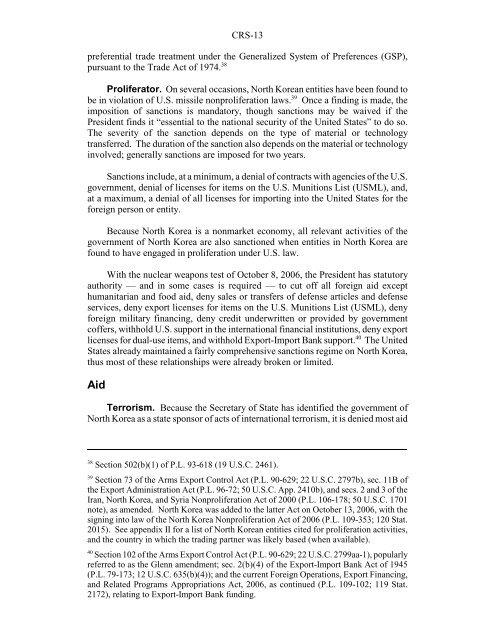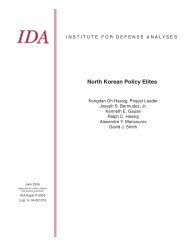North Korea: Economic Sanctions - North Korean Economy Watch
North Korea: Economic Sanctions - North Korean Economy Watch
North Korea: Economic Sanctions - North Korean Economy Watch
Create successful ePaper yourself
Turn your PDF publications into a flip-book with our unique Google optimized e-Paper software.
CRS-13preferential trade treatment under the Generalized System of Preferences (GSP),pursuant to the Trade Act of 1974. 38Proliferator. On several occasions, <strong>North</strong> <strong>Korea</strong>n entities have been found tobe in violation of U.S. missile nonproliferation laws. 39 Once a finding is made, theimposition of sanctions is mandatory, though sanctions may be waived if thePresident finds it “essential to the national security of the United States” to do so.The severity of the sanction depends on the type of material or technologytransferred. The duration of the sanction also depends on the material or technologyinvolved; generally sanctions are imposed for two years.<strong>Sanctions</strong> include, at a minimum, a denial of contracts with agencies of the U.S.government, denial of licenses for items on the U.S. Munitions List (USML), and,at a maximum, a denial of all licenses for importing into the United States for theforeign person or entity.Because <strong>North</strong> <strong>Korea</strong> is a nonmarket economy, all relevant activities of thegovernment of <strong>North</strong> <strong>Korea</strong> are also sanctioned when entities in <strong>North</strong> <strong>Korea</strong> arefound to have engaged in proliferation under U.S. law.With the nuclear weapons test of October 8, 2006, the President has statutoryauthority — and in some cases is required — to cut off all foreign aid excepthumanitarian and food aid, deny sales or transfers of defense articles and defenseservices, deny export licenses for items on the U.S. Munitions List (USML), denyforeign military financing, deny credit underwritten or provided by governmentcoffers, withhold U.S. support in the international financial institutions, deny exportlicenses for dual-use items, and withhold Export-Import Bank support. 40 The UnitedStates already maintained a fairly comprehensive sanctions regime on <strong>North</strong> <strong>Korea</strong>,thus most of these relationships were already broken or limited.AidTerrorism. Because the Secretary of State has identified the government of<strong>North</strong> <strong>Korea</strong> as a state sponsor of acts of international terrorism, it is denied most aid38Section 502(b)(1) of P.L. 93-618 (19 U.S.C. 2461).39Section 73 of the Arms Export Control Act (P.L. 90-629; 22 U.S.C. 2797b), sec. 11B ofthe Export Administration Act (P.L. 96-72; 50 U.S.C. App. 2410b), and secs. 2 and 3 of theIran, <strong>North</strong> <strong>Korea</strong>, and Syria Nonproliferation Act of 2000 (P.L. 106-178; 50 U.S.C. 1701note), as amended. <strong>North</strong> <strong>Korea</strong> was added to the latter Act on October 13, 2006, with thesigning into law of the <strong>North</strong> <strong>Korea</strong> Nonproliferation Act of 2006 (P.L. 109-353; 120 Stat.2015). See appendix II for a list of <strong>North</strong> <strong>Korea</strong>n entities cited for proliferation activities,and the country in which the trading partner was likely based (when available).40Section 102 of the Arms Export Control Act (P.L. 90-629; 22 U.S.C. 2799aa-1), popularlyreferred to as the Glenn amendment; sec. 2(b)(4) of the Export-Import Bank Act of 1945(P.L. 79-173; 12 U.S.C. 635(b)(4)); and the current Foreign Operations, Export Financing,and Related Programs Appropriations Act, 2006, as continued (P.L. 109-102; 119 Stat.2172), relating to Export-Import Bank funding.













